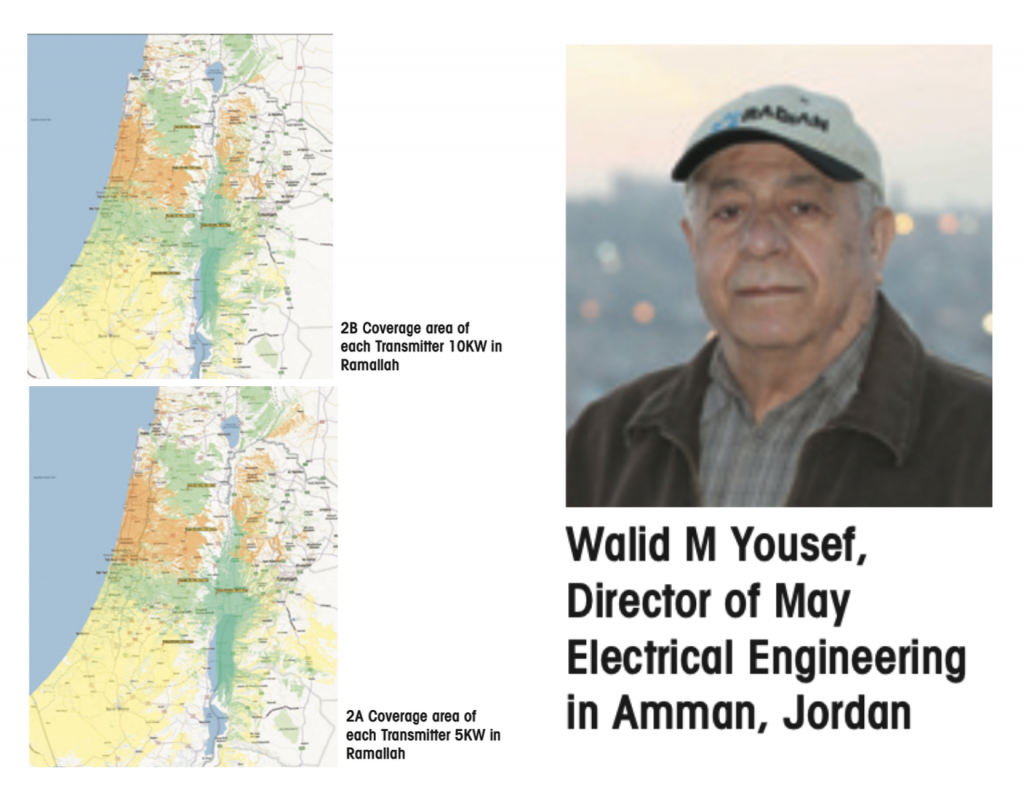 A six-day ABU Technical Advisory Service mission to the Palestine Broadcasting Commission (PBC), one of the ABU’s newest members, took place from 16 to 22 April 2013.
A six-day ABU Technical Advisory Service mission to the Palestine Broadcasting Commission (PBC), one of the ABU’s newest members, took place from 16 to 22 April 2013.
The mission was conducted on a voluntary basis by Walid M Yousef, Director of May Electrical Engineering in Amman, Jordan. He made a number of recommendations on how PBC could improve its radio and television transmission services.
PBC arranged for him to make field visits to five Voice of Palestine (VOP) transmitting stations within an 85 kilometre range of Ramallah. VOP is a subsidiary of PBC, which is using an uncontrolled simulcast where three of these stations’ transmitters are working on one frequency, 99.4MHz, and two are working on another frequency, 90.7MHz.
Four of these stations are using vertically polarised Omni directional stacked dipole antenna systems and the station in Ramallah is using a circularly polarised antenna system, with two bays, each with three panels facing north, east and south. All these stations are transmitting one analogue stereo audio programme.
PBC also arranged two technical meetings to discuss their regional studios project and networking methods among these studios and the master control room in Ramallah. A field visit was also made to a new building under construction which will house Palestine Broadcasting (Radio & Television) and Palestine News & Information Agency.
A specialist company created coverage, field strength and interference maps after collecting technical details of transmitting stations. The company used space shuttle views of the earth that included terrain data and access to sensitive signal measurement capabilities.
Based on his observations during the field visits, discussions with PBC engineers and the use of these maps, Mr Yousef submitted a detailed report to PBC which included these recommendations:
- Verify the predication maps by taking field strength FS measurements and to confirm building penetration losses at FM frequencies as being18 dB loss for the ground floor of a medium size building.
- To contact antenna systems manufacturers/supplies to provide null fill for all antenna systems and beam tilt for three antenna systems to provide higher signal in targeted cities.
- More directivity toward the southerly direction (Jerusalem) at the Ramallah antenna system and modify antenna systems at other stations to Omni directional with preferred direction.
- Change the operating frequency of the Nablus or Hebron stations since the existing signal distribution network cannot provide the requirements for synchronisation of multiple transmitters.
Mr Yousef also proposed to PBC a signal distribution network by providing the block diagram of audio codec’s multiplexing equipment for programme audio, voice and data for transport over E1contribution and distribution networks connecting the master control room in Ramallah to regional studios and national and regional transmitting stations.
The Palestine Public Broadcasting Commission was established in 1993 shortly after the formation of the Palestinian Authority. It started operating as a state-owned radio and TV service in the Gaza strip with a branch office in Ramallah City under the name Palestine Broadcasting Corporation (PBC). In 2010, the status of PBC was changed by presidential decree from a state-owned institution into a public institution. The role of the Palestine Public Broadcasting Commission is to represent the Palestinian people wherever they are.

